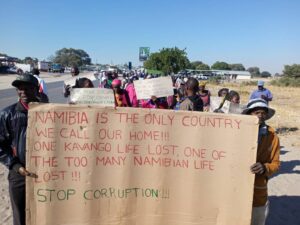
By:Annakleta Haikera
Unregistered and undocumented people of the two Kavango regions have demanded that government speed up the process of registering them after accusing the Rundu office of dragging its feet on the matter.
The two Kavango regions have the highest number of stateless and undocumented persons in the country, with Kavango East having 32,720 undocumented and 20,610 in the Kavango West.
Kavango East has the highest percentage of people undocumented followed by Omusati and Kavango West, according to a report on the stateless and undocumented persons in Namibia.
Stateless persons in Namibia are extremely vulnerable to arbitrary and lengthy immigration detention.
This comes as a group of undocumented residents of Kavango East and West had a peaceful demonstration on Friday to hand in a petition of their demands to the Kavango East Regional Governor Bonifatius Wakudumo.
The petition was received by Damian Maghambayi, Chairperson the Kavango East Regional Council Management Committee.
Maghambayi told the demonstrators that the right steps needed to be taken to provide answers as to why many people are stateless and undocumented.
He said the government is aware of the issue and is busy with the registration of the people who are stateless and undocumented.
In 2021, Cabinet instructed the Ministry of Home Affairs to draft relevant legislation to legalise the status of undocumented and stateless persons in the country. According to Maghambayi, so far they have registered several individuals within the region and the names were verified and submitted at the Rundu Urban Constituency.
The Undocumented Residents of Kavango East and West Concerned Group (UROKEWCG) Chairperson Patrick Shiyemo Kashera stated that people of the Kavango regions travel long distances with the hope of getting national documents, but many are times they are turned down by “indisciplined” and “frustrated” officials of the Rundu Home Affairs and Immigration office.
“It is so hard for the ministry to issue documents while people are still living whilst it is fast for them to process death certificates for those who were not having documents when they were alive. The ministry used to take fingerprints of the dead,” Kashera said.
According to the group, they have also observed unfair appointments done at the Rundu office, as those heading the two departments of civil registration and that of immigration are not from either the Kavango East or Kavango West region.
Kashera, on behalf of the group, demanded for the equitable balancing of management structures that should involve people from the two Kavango regions and not only individuals from other regions at the helm of the Rundu office.
He further noted that the practice of putting forward the death over the living should come to an end and that the living must be given national documents before they die.
“The ministry should increase staff and facilities in both regions in order to minimise travelling and save on costs.”
Anna-Marie Litwayi, who is among those that are regarded as stateless, told The Villager that she has to travel 400km hoping to be issued national documents but it always turns out that they are sent back to look for more documents thatthey are unable to get.
“And then at the end we are forced to stay home undocumented and we donot benefit from any other governmental grant that is also one of the things leading to poverty and deaths,” Litwayi explained.
The two Kavango regions are estimated to have a population of more than 260,000 people, with 53,330 reportedly stateless and undocumented.









Comments